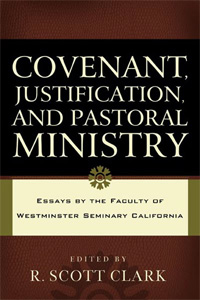He says, that believers have no righteousness of their own. Now, it cannot be denied, that if there were any righteousness of works, it might with propriety be said to be ours. Hence he leaves no room whatever for the righteousness of . . . Continue reading →
Justification
Heidelcast Episode 3b: Follow Up to DGM (Part 2)
Heidelcast episode #3: A Gentle Rebuke to Brother John (pt 2)
Leaving, Leaning, and Looking (Phil 3:8-14)
The time after Christmas, including, in some places Boxing Day—for which different etymologies have been given—is a time for writing thank you notes. The Apostle Paul also wrote a thank you letter and the Spirit of God preserved it for us in . . . Continue reading →
“Feet Shod with the Gospel of Peace”
Why the Heidelberg Catechism?
A Romanist Responds to the Reformation
I’ve had a fair bit of response to the HB over the years. Some of it comes over the transom from anonymous writers (anonymous comments are generally forbidden on the HB) and it usually goes where anonymous correspondence should go. This one, . . . Continue reading →
The Treasury Of The Church—”A Satanic Mockery”
Now very many persons see the base tricks, deceits, thefts, and greediness with which the indulgence traffickers have heretofore mocked and beguiled us, and yet they do not see the very fountain of the impiety itself. As a consequence, it behooves us . . . Continue reading →
Ursinus On Jesuits And Hypocrites
This question is proposed on account of those who glory in the name of Jesus, and yet, at the same time, seek their salvation, either wholly or in part, in some other place without him, in the merits of the saints, in . . . Continue reading →
The Moralists Will Be Back
An HB Classic
It is an historical fact that moralism (the confusion of justification with sanctification) never dies, it just goes dormant periodically. The Reformation defeated 1000 years of moralism only to see forms of it re-emerge in the Protestant churches even before Luther died. . . . Continue reading →
CJPM Now Available as an E-Book
Federal Vision Audio
In 2007 the Synod the United Reformed Churches in North America adopted a nine point declaration against the self-described federal vision movement. They described these points as “pastoral advice.” Here’s a written exposition of the Nine Points. These nine talks (below) also explain . . . Continue reading →
When Is a Church Not a Church?
An HB Classic
I was searching for something the other day and ran across chapter 18 of the Scots Confession (1560) which speaks to the “Notes” (from the Latin, nota or “mark” or “indicator”) of the True Kirk (church). I’ll return to the Scots Confession . . . Continue reading →
What Is The Article Of The Standing or Falling Of The Church?
Articulus iustificationis dicitur articulus stantis et cadentis ecclesiae (the article of justification is said to be the article of the standing or falling of the church)” —J. H. Alsted (1588–1638), Theologia scholastica didactica (Hanover, 1618), 711. For the sense and origins of . . . Continue reading →
Why Do Some Say That Doubt Is Of The Essence Of Faith?
Curt writes to ask, I have a question. In “A Brief History of Covenant Theology” You write: For most of the Medieval period, the Western (Latin) church and the major theologians agreed that God says what he says about us, because we . . . Continue reading →
Is The Gospel Preached Or Lived?
An HB Classic
Colin raised this question a while back on Unashamed Workman. He asked for comments and, as Mike had just touched on this during the Westminster Seminary California Missional and Reformed Conference, I piped up: Hi Colin, This business of “living the gospel” . . . Continue reading →
Synod Of Dort Day: Arminius Brought Out Of Hell
[We reject the errors of those] Who teach: That Christ by His satisfaction merited neither salvation itself for any one, nor faith, whereby this satisfaction of Christ unto salvation is effectually appropriated; but that He merited for the Father only the authority . . . Continue reading →
Bavinck On Gospel In The Narrow Sense
And indeed, strictly speaking, there are no demands and conditions in the gospel but only promises and gifts. Faith and repentance are as much benefits of the covenant of grace as justification (and so forth). Herman Bavinck, Reformed Dogmatics, 4.454 (HT: James . . . Continue reading →
Heidelcast 25: With Lane Keister On The Federal Vision In The PCA
Here’s a flashback to the Federal Vision controversy, in the PCA, as it was 2010. The is the first of five episodes with Lane on the FV and related questions. It’s interesting to time travel, as it were, and listen to the . . . Continue reading →
Calvin: There Are Two Parts In Christianity
Now, by these words the Apostle shows that there are two parts in Christianity which correspond with the two tables of the Law. Therefore, he who separates the one from the other, has nothing but what is mutilated and mangled. And hence . . . Continue reading →
Is Faith a Work?
The question comes (paraphrasing): Since Scripture says, “believe,” (e.g. Acts 16:31) it seems that we are commanded to believe. If the command to believe is an imperative and an imperative is “law,” and if the answer to the command “believe” is faith, . . . Continue reading →
Heidelcast 27: With Lane Keister on the Imputation of Christ’s Active Obedience
HB reader Nick writes to ask about the imputation of Christ’s active obedience. Is it true that the Westminster divines, Twisse, Vines, and Gataker opposed the imputation of the active obedience of Christ and that the phrase, “the whole obedience of Christ” . . . Continue reading →










